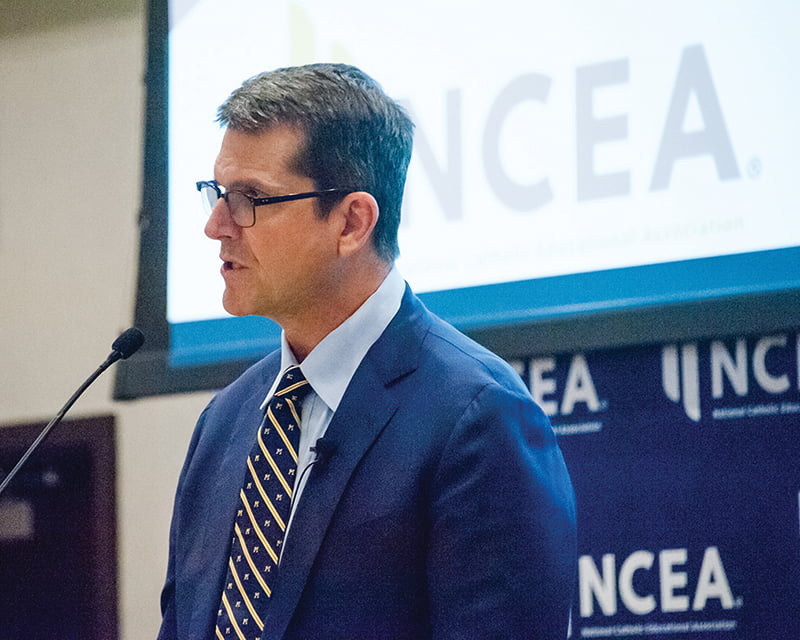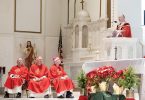
University of Michigan head coach Jim Harbaugh delivers the keynote address Feb. 21 at the National Catholic Education Association’s Visions for Excellence Soul of Youth Sports Conference at the Hyatt Place Kansas City/Lenexa City Center.
by Todd Habiger
todd.habiger@theleaven.org
LENEXA — The team. The team. The team.
This was the refrain former University of Michigan head football coach Bo Schembechler used to repeat like a drumbeat to Jim Harbaugh when Harbaugh was a quarterback for Michigan from 1982-86.
The team, the team, the team.
“When I first heard that, I hadn’t reached the level of maturity where I could understand the fundamental truth of what Bo Schembechler was saying,” Harbaugh said. “But over the course of my many years as a college and professional player — and now a coach — I can tell you without reservation that the number one most important element of a team culture is its focus on the group as a whole.”
Harbaugh, the current head coach at the University of Michigan, was the keynote speaker Feb. 21 at the National Catholic Education Association’s Visions for Excellence Soul of Youth Sports Conference at the Hyatt Place Kansas City/Lenexa City Center.
In his keynote address, Harbaugh discussed how strong sports programs can strengthen schools.
“What we in the sports world can do is become part of a movement that reverses the tide toward individualism in our communities. We can lead by example,” Harbaugh said.
Harbaugh said that a team culture in sports results in a more fulfilling experience than that of a culture that overemphasizes individual contributors.
“Teamwork in sports produces better overall performance compared to an uncoordinated collection of talented individuals,” he said.
“If you want to go fast, you can go on your own,” he added. “But if you want to go far, go together.”
Harbaugh said that when a group embraces a team culture, that team becomes a community characterized by deep human relationships. When cultivated in a school setting, a team with a strong team concept can have an infectious quality that spills over to the other students in the school.
“The players on the team can’t solve every problem that the school, faculty and students contend with,” Harbaugh said. “But the players can control what they do, what they think, how they relate to their teammates and — by extension — how they relate to their school.”
Harbaugh said that he has seen an entire community embrace the team culture during his frequent mission trips with his family to Piura, Peru.
After his first mission trip, he returned to Stanford University where he was the head football coach at that time, and his friends asked him what he had learned.
“What I said was: I made a remarkable discovery — that the average person in northern Peru is more content than the average person in Silicon Valley,” Harbaugh said.
“I’m still stunned by the paradox of that,” he added. “How can those with nothing be more at peace than those with seemingly everything?”
Harbaugh said he believes the Peruvian people are content because they aren’t living solely to maximize their individual interests.
“Out of necessity, they need to rely on each other because there is no safety net,” he said. “By relying on each other, they live a deep connection and build close bonds with their neighbor.”
That sense of interdependence — of community — said Harbaugh, is the sort of team mentality that we here in the United States could learn from — not only regarding our school athletic programs, but throughout our lives.
Archbishop Joseph F. Naumann kicked off the youth sports conference with Mass on Feb. 21. The three-day conference gathered coaches and administrators from across the nation to discuss strategies and practices for serving Catholic student-athletes.






